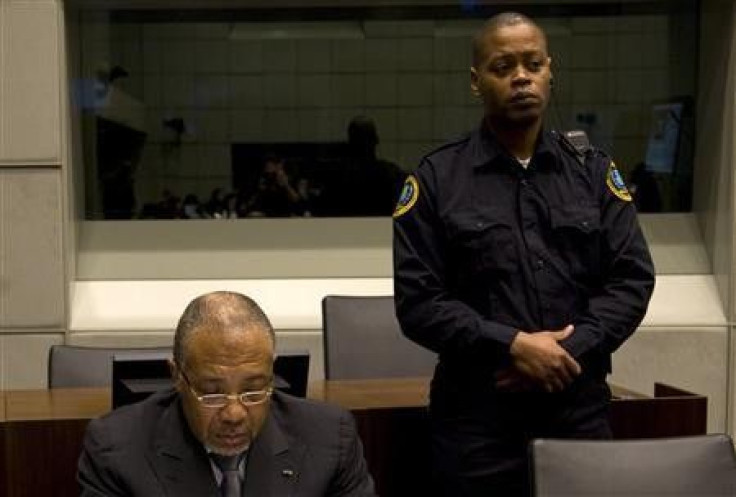Taylor's lawyer storms out of war crimes court

The defence lawyer for former Liberian president Charles Taylor defied the Sierra Leone war crimes court on Tuesday, walking out in protest ahead of closing arguments in the case and calling it a farce.
Taylor, the first African ruler to stand trial for war crimes, is charged with instigating murder, rape, mutilation, sexual slavery and conscription of child soldiers during a brutal civil war in Sierra Leone. He denies the charges.
Defence lawyer Courtenay Griffiths stormed out after judges at the Special Court for Sierra Leone ruled on Monday against allowing the defence to file a final 600-page document because they had missed a January 14 deadline to submit it.
Presiding judge Teresa Doherty warned Griffiths he risked being found in contempt, a charge carrying a fine or prison sentence.
Our presence in court is incompatible in representing the interests of the accused, Griffiths said, telling reporters outside the court that the situation was a complete farce.
The shock exit, a reminder of when Taylor refused to attend the start of his trial in June 2007, cast a shadow over the hearing, but prosecutors were allowed to present their closing arguments in a case that has lasted more than three years.
If convicted, Taylor's sentence would be at the discretion of the judges, but the court previously has handed down terms of 15 to 52 years, a court spokesman said.
Prosecutor Brenda Hollis described Taylor as man with insatiable greed for wealth and power who had portrayed himself as a victim of an international conspiracy.
Citing testimony from a man whose brother's 10 fingers were cut off before he was shot and killed, Hollis said this was testimony from a real victim of killers who knew no restraint.
The accused is rightly before you as the man most responsible for the crimes with which he is charged. The evidence proves beyond reasonable doubt that Mr Taylor is guilty of those crimes, Hollis said.
WIKILEAKS
Prosecutors accuse Taylor of directing Revolutionary United Front rebels in a campaign of terror against civilians in Sierra Leone, pocketing blood diamonds for profit or to buy weapons.
But they spoke to an empty dock for much of Tuesday.
After Griffiths walked out, Taylor had remained in court as guards told him that judges were ordering him to stay, but he did not reappear after the morning break.
Claire Carlton-Hanciels, a court-appointed defence representative, told judges Taylor was upset, needed some rest and had voluntarily absented himself from the hearing.
Griffiths has questioned the Sierra Leone court's impartiality, citing leaked U.S. diplomatic cables he says suggest Taylor's prosecution was politically motivated.
Although the court admitted two cables as evidence, it refused to investigate them and Griffiths requested time to respond to the leaked cables in his final document.
The U.S. ambassador to Liberia, Linda Thomas-Greenfield, wrote in a March 10, 2009 cable that if Taylor was acquitted or given a light sentence, his return to Liberia could tip the balance in a fragile peace.
The international community must consider steps should Taylor not be sent to prison for a long time, she wrote.
Justice Richard Lussick challenged Griffiths's actions.
If Taylor thinks he can ... disobey orders at will, then he is running this court, not us, Lussick said. You're not running the court you know, he added.
Griffiths told reporters he would appeal Monday's ruling preventing him from lodging his final document and warned he would boycott proceedings until the appeal is ruled upon.
© Copyright Thomson Reuters 2024. All rights reserved.











